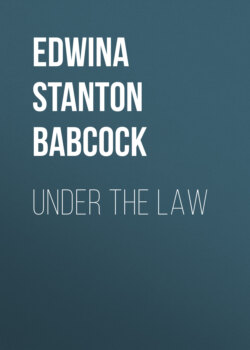Читать книгу Under the Law - Edwina Stanton Babcock - Страница 4
На сайте Литреса книга снята с продажи.
CHAPTER II
ОглавлениеTable of Contents
UNDER THE LAW
The house faced on the river. The massive hills that turned bronze in the setting sun were irregular background for the white castle-like buildings on the eastern banks. But the western shore of the Hudson had set between small mountains little, hilly-looking villages; among them were the Dutch towns, Morris and Willow Roads, whose old roofs, slowly giving way to factories and churches of one period, were at last disappearing before the real estate man's idea of a suburban development. At the edge of this development were the far-apart homes of the well-to-do and the long lines of green lawns; the rich trees and tinted shrubberies were illumined and laced with a thousand lovely colors of massed iris and waving tulips set, like the gardens on the river, against royal purple of opposite shores.
Sard's room was in the square tower of the house her father had built in his more grandiloquent days. If the Judge's wife had lived, they might have lengthened and strengthened the home into something like a practical sunny house of our day, but as it was, the curious construction of red sandstone and black and white Tudor retained its perplexed conglomerate air, only saved from freakishness by the soft mantle of vines that ruffled the chimney and girdled its windows. All around to the sloping banks of the river were the trees that the Judge's father had planted and tended into maturity. It was a League of Nations in Trees! English maples, Norway spruces, lindens, horse-chestnuts from Versailles, Japanese maples and Greek planes and orange trees from along the Mediterranean. To Sard, since her very first party dress, those trees had seemed a sort of litany; the noble forms of every clime and country raised their mysterious crests, sought with yearning roots, were full of the first murmur of June-bee days; waved like women the soft undulations of their shapes, bathed in blue morning or loomed in formless grandeur on the night.
It was a puzzle to Sard that these trees kept to the laws of their growth in one soil.
The windows of Sard's room opened to the four winds and gave on the tree-fringed expanse of water. At night those tower panes were literally dashed with stars. As a little girl she had lain watching their fairy dance like fire-flies; later her clear brown eyes became fixed thoughtfully on what seemed strings of jasmine-like blossoms. Coming home from boarding-school, the stars half thrilled her with mystical trailing blossoms of a home-sky, but now of late, after college and a new sense of values, these stars had suddenly ceased throwing their soft lights across the panes. East, west, north and south, they now stood in an awful order like knights leaning on spears. They were challenging in their geometry, severe in their puzzling fixity; they seemed to say—"Well, Sard, you are grown up now; you make your own choices; what is your law? We have our law—have you discovered yours?"
During two years at college Sard had thought little about "law." The stars there had asked few questions. They had seemed companionable, dashing confidently, shining over the campus with capricious groups of girls; they had shone on bright camp-fires and twinkled at the saucy songs shouted into their very eyes. The college stars had seemed to vibrate like sleigh-bells to such defiant songs as "Where, oh death, is thy stingalingaling?" and they thrilled to a thousand funny whistles and calls of a rather self-consciously emphasized youth. But here they were back with their spell and their question. Knights with spears, they rode softly past the window-panes, keeping their geometric order, saying, insistently—"This is our law; we obey always. What is your law?"
At first the thing had awed Sard, then saddened her. So after all, the world physical went on this grand orderly, terrible sort of way, and so did the spiritual world seem to, no matter how much one wanted to change things; but the world of people and purpose? how about that?
What should be the laws of one's life? The books on Sard's shelves gleamed in the moonlight. Here and there they had helped and suggested and one or two men or women Sard had met seemed to have an idea. Then this thing they called "Love"—Sard, lying in bed, pondered; did love do what people said it did, sweeten, make deeper, wiser? Well, Sard had seen girls at college who became engaged, said they were in love, certainly were changed and made queer by a force bigger than themselves; and yet it all seemed to end trivially. One or two children, a little house not very well kept, a tired husband, not "enough" money ... and there were other girls who mocked at love and played with it and coquetted until their faces became cynical, hard and horrible.... If there were things that swept people so they rose bigger and finer than they had ever dreamed themselves to be, that might count some way, but how did they start becoming bigger and finer? One couldn't go down-stairs and announce to one's family—"From now on I am going to be bigger and finer." So, tossing away from the star inquiry, turning penitently back to it, the young form fought out the thing. A sense of awful loneliness and youth came to Sard, an awful sense of not knowing herself, not working from the most inward of her. She stretched out appealing arms—"What are my laws?" she asked softly. "Oh, what are my laws?" For Sard knew, and knew with feelings of awe that for every life that counted there must be laws.
